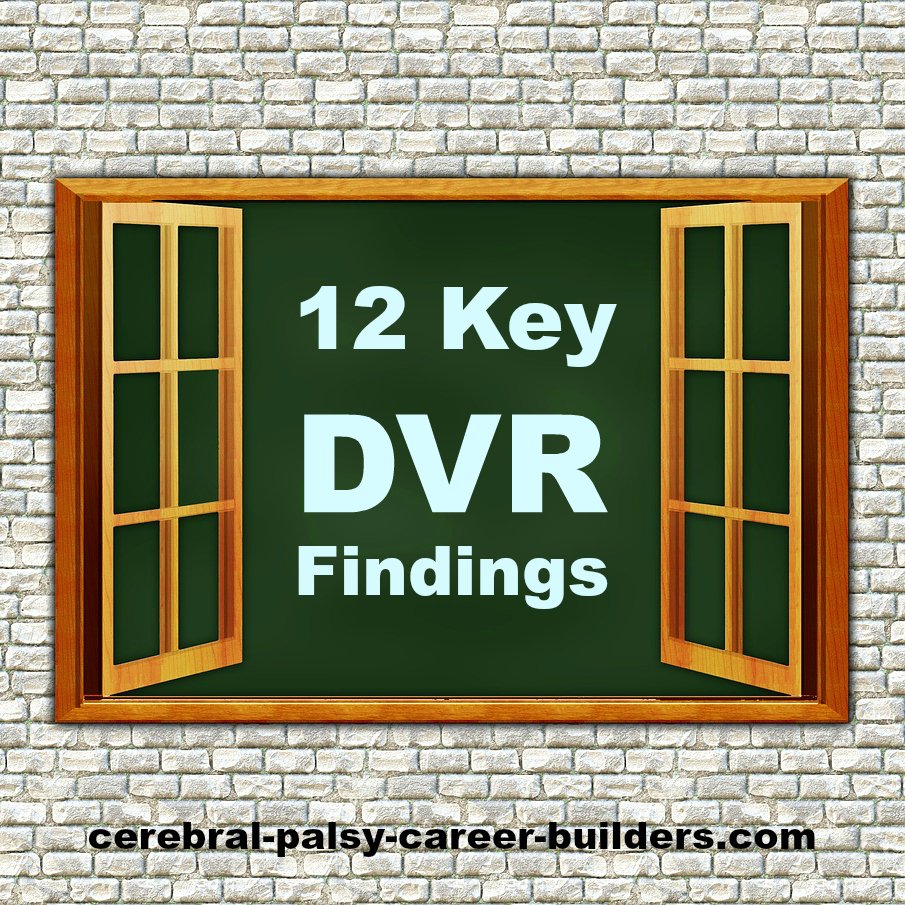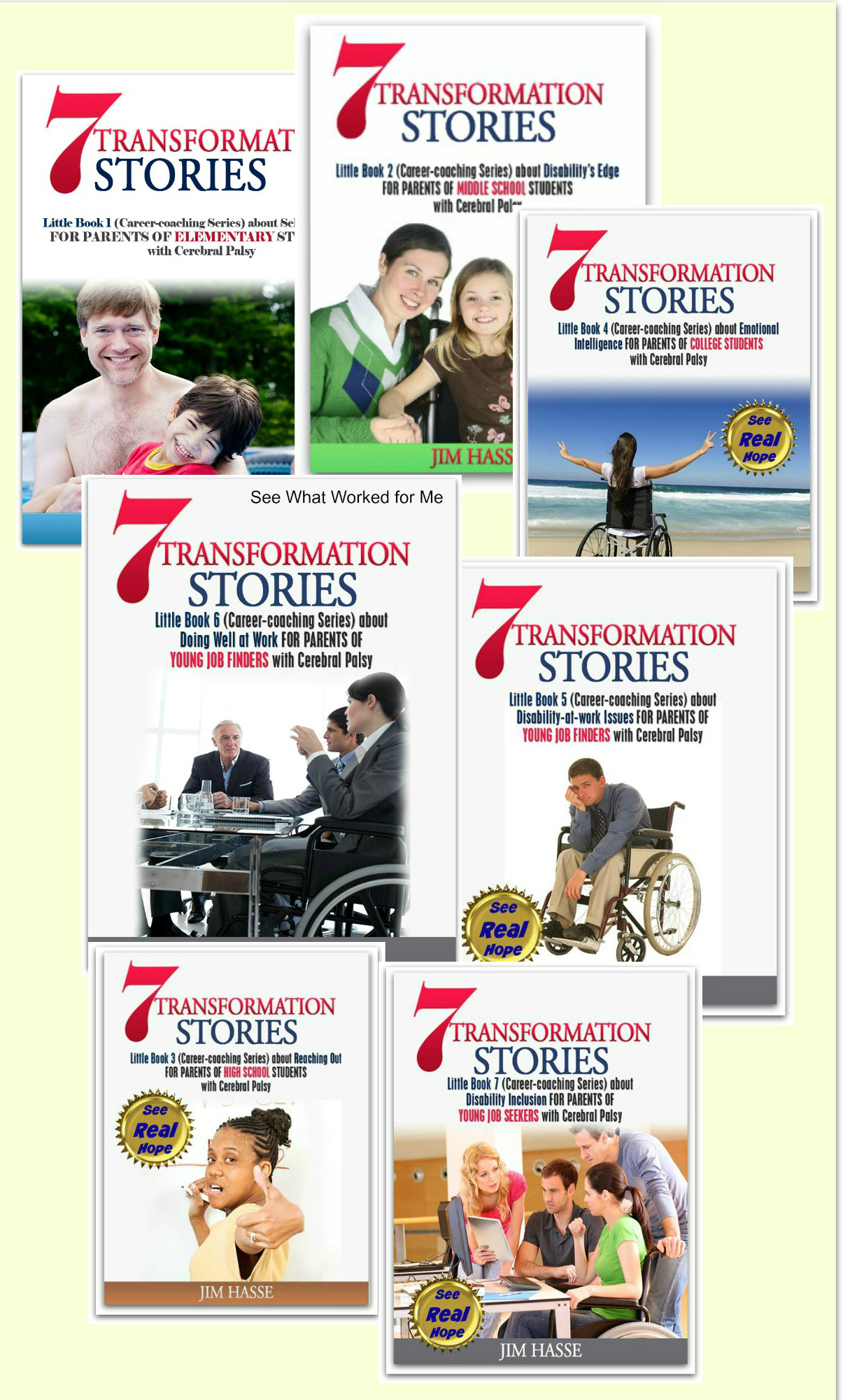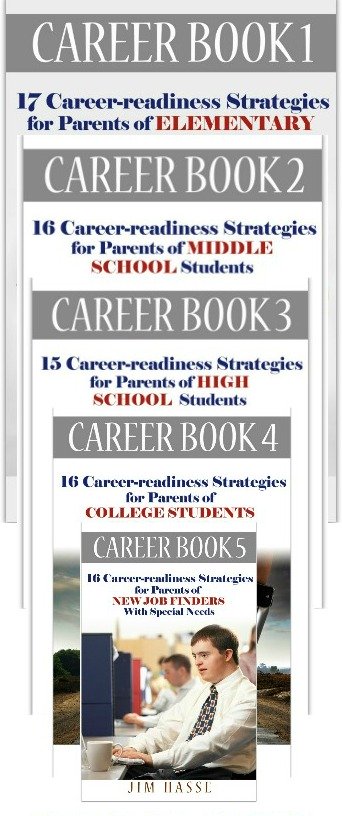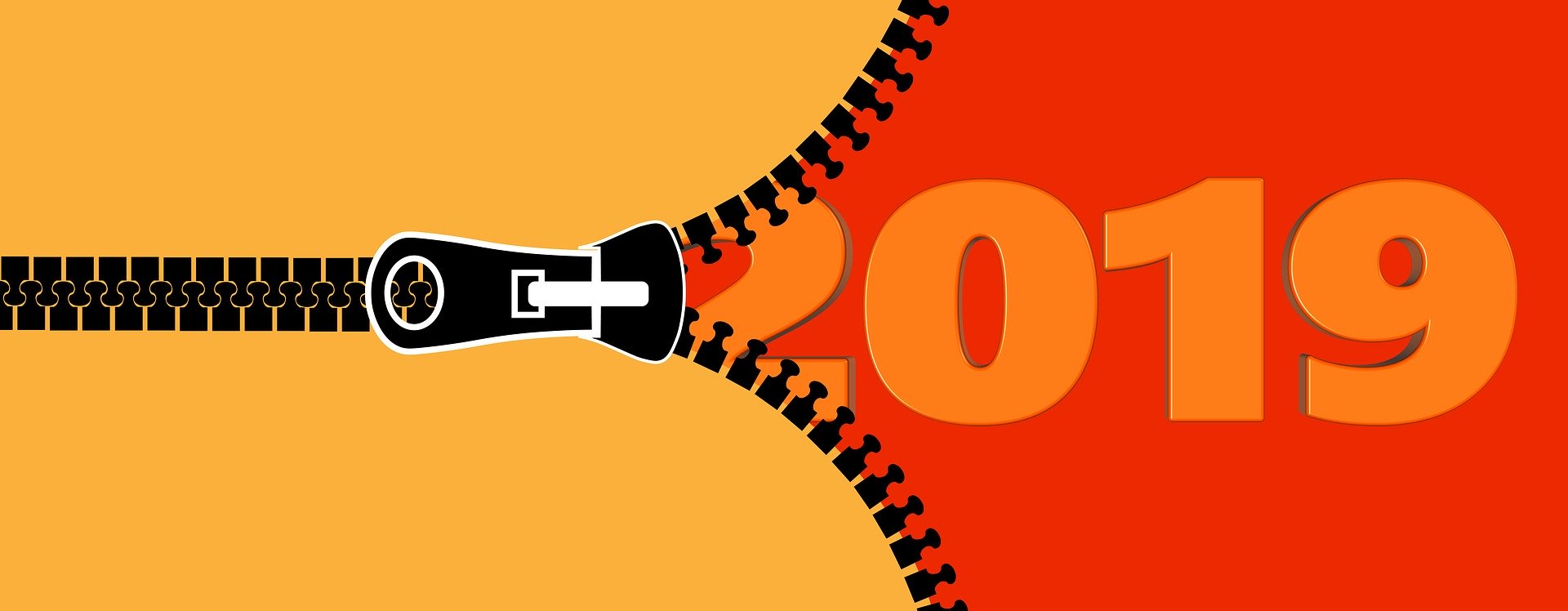Vocational Rehab: Cerebral Palsy
Career Builder for College
Students
By Jim Hasse, ABC, GCDF, Disability Employment Expert
_________________________________________________________
Vocational rehab counselors may be playing a key role right now in the life of the college student with cerebral palsy (CP) you’re mentoring as a parent or coach. After all, making the transition from school to work is not easy for anyone and can be especially tricky for someone with a disability.
State-based vocational rehab services for your youngster range all the way from vocational training, preparation and workplace accommodations to finding and keeping a job and living as independently as possible.
Those vocational rehab services basically help individuals with a disability answer this question:
How can you best position yourself with the employers you are targeting in your job marketing campaign?

Perceptions of vocational rehab counselors
That’s why I find so interesting the results of a recent survey which involved the perceptions of job development professionals such as vocational rehab counselors. Those survey results provide your college student with some potential job seeker strategies to consider when he or she hits the job market.
In August 2011, TransCen reported findings on the attitudes and beliefs of job development professionals toward employers to the Heldrich Center for Workforce Development at Rutgers University.
The report is part of the New Jersey DiscoverAbility project, a Comprehensive Employment Services Medicaid Infrastructure Grant funded by the U.S. Department of Health and Human Services, Centers for Medicare and Medicaid Services to the New Jersey Department of Human Services and its management partner, the John J. Heldrich Center for Workforce Development at Rutgers.
Results of the report focused on the attitudes and beliefs of job development professionals, such as state vocational rehab counselors, toward employers and the employment process.
The study’s sponsors sought to examine how those beliefs tend to shape the job development and placement practices of the New Jersey and Maryland professionals involved in a set of six two-hour focus groups (36 participants) and a web-based survey (260 participants).
The majority of the respondents (80 percent) to the web-based survey were employed in community rehabilitation programs, providing services to a diverse population of people with physical, mental and emotional disabilities.
Most of the vocational rehab respondents were female (74 percent), and the majority had at least a BA degree (61 percent). Almost 34 percent of the respondents had 10 or more years of experience in job development.
I found what the vocational rehab participants said about employers quite interesting -- although that was not the primary focus of the study.
For instance, consider the following nine snippets I’ve chosen to highlight from the overall results. Here’s how the vocational rehab professionals in the survey responded. Those results can give your college student clues for building a “getting hired” strategy, one designed to convince targeted employers to “hire me.”
- 86 percent of the respondents
agreed with this statement: “Employers with a history of hiring people
with disabilities are more likely to hire my client.”
That tells me that targeting employers with proven track records of attracting, hiring and promoting people with disabilities should be a primary strategy.
- 74 percent agreed that “employers base
hiring decisions on the bottom line.” 81 percent of respondents with five
or more years of experience agreed with this statement compared to 65
percent for those with less than five years experience.
Said one respondent, “Employers who base hiring decisions on the ‘bottom line’ might just not believe in the work capacity of people with disabilities.”
As a job seeker, that would prompt me to look at my past accomplishments, identify my skills and attributes which made those situations successful and then put what I had achieved into bottom-line, quantifiable results.
You may want to guide your college student into doing the same.
- 69 percent agreed that “employers are
more likely to hire people with disabilities if they have entry-level
positions.”
If I were just getting out of school, I would not hesitate to take an entry-level job (no matter how menial it may appear to be), if my research shows the company and its particular field have good long-term prospects. Getting in on the ground floor of a company which is likely to grow rapidly is a golden opportunity.
That’s another tip to pass on to your mentee.
- 68 percent agreed that “employers need
to be sold on hiring people with disabilities.” 75 percent of respondents
with five or more years of experience agreed with this statement compared
to 67 percent for those with less than five years of experience.
I would hone my “bottom-line” success stories and use them as the foundation for my job marketing campaign -- and practice telling them in a concise way during job interviews.
I strongly recommend this strategy for your youngster with CP.
- 67 percent agreed with this
statement: “Employers prefer to know in advance if an applicant has a
disability.”
My “bottom-line” success stories would show how learning how to live well with my particular disability has helped me develop the skills and attributes that were vital in achieving those accomplishments.
Your college student needs to think about how to best meet this employer expectation of knowing in advance about his or her CP.
- 62 percent agreed with this
sentence: “Employers are less likely to hire people with disabilities in the
current economy.” 80 percent of respondents with five or more years of
experience agreed with this statement compared to 58 percent for those
with less than five years of experience.
One respondent said, “I think a major barrier is the economy right now. Years ago, our clients wanted an entry-level job nobody wanted. Now, we are fighting to get these jobs.”
I would evaluate my field of study for future career prospects and commit myself to lifelong learning in a job sector where job demand outstrips supply of qualified candidates.
- 57 percent agreed that “employers are
reluctant to hire people with disabilities due to the perceived costs
involved.”
Part of my “sales pitch” as a job seeker would be to talk about any accommodations I may need, the costs involved and how I could help minimize the time, work and costs of getting me up to speed as a new hire.
- 56 percent agreed that “employers
are likely to hire clients for volunteer jobs.”
I would volunteer, offer to work for free for the opportunity to show what I could do or take an internship without pay -- anything to get my foot in the door of the right company and make myself the exception to the common occurrence of “being the last to be hired.”
- 52 percent agreed the “employers with
off-site HR mangers are less likely to hire people with disabilities.”
Unless I had an entrepreneurial spirit (and perhaps knew some buddies from college who were involved in start-up companies where I could also spread my wings), I would target companies with well-established HR and diversity programs (backed by third-party endorsements).
Which of these DVR
findings
is most eye opening for you
and your college student? Why?
Join PACER’s Facebook discussion.
Three statements from vocational rehab counselors in the survey popped out for me because they received nearly even splits (and can be perceived unconvincing benefits as reasons to hire your college student):
- 40 percent agreed, 30 percent were
neutral and 30 disagreed with this statement: “Small businesses are
more likely to hire people with disabilities.”
- 35 percent agreed, 40 percent were
neutral and 25 disagreed with this statement: “Employers are
influenced to hire by available tax incentives.”
- 32 percent agreed, 43 percent were neutral and 25 disagreed with this statement: “Employers with high staff turnover are motivated to hire people with disabilities.”
I would build my job search strategies around the first nine vocational rehab counselor findings above.
However, your college student may want to think twice about targeting a small business (unless he or she has an inside, trusted contact in the company), hyping the tax incentives a prospective employer may receive by hiring him or her and using the “I’ll-stay-with-you” pitch as a retention benefit he or she may bring to the table.
Which of these DVR findings
is most eye opening for you
and your college student? Why?
Join PACER’s Facebook discussion.
Return from Vocational Rehab to Interview Tips
Go to Cerebral Palsy Career Builders
This is Creative Commons content. You can freely and legally use, share and repurpose it for non-commercial purposes only, provided you attach this sentence and the following attribution to it (including the two links):
Originally written and illustrated by Jim Hasse, ABC, GCDF, owner of Hasse Communication Counseling, LLC, who, as a person with cerebral palsy, served for 10 years as a vice president in a Fortune 500 company during his 29-year career in corporate communication. He’s an Accredited Business Communicator, certified as a Global Career Development Facilitator and author of 14 Amazon books about disability awareness and disability employment issues.






